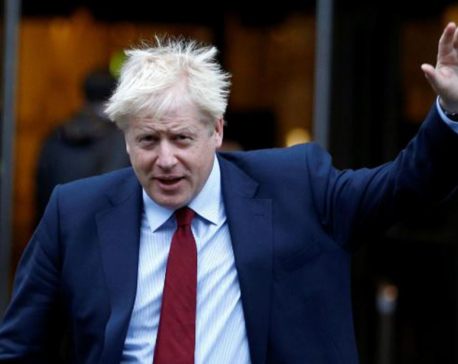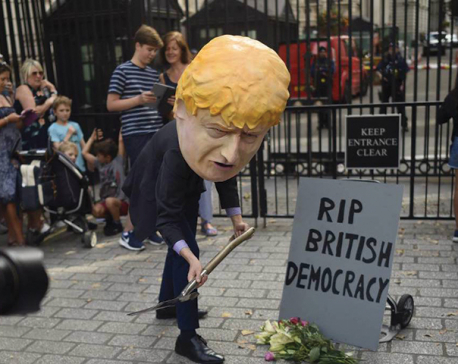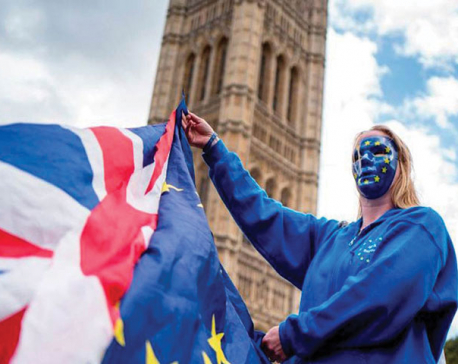
OR

More from Author
UK can now look forward to the painful grind of negotiations and policy implementation, probably lasting many years, to make the best of a bad Brexit
NEW YORK – With the United Kingdom set to withdraw from the European Union at 23:00 GMT on January 31, Prime Minister Boris Johnson will finally achieve the Brexit he has championed for the last four years. But, as the saying goes, be careful what you wish for.
Four issues were part of the divorce agreement that Johnson concluded with the EU and Parliament approved this month: future contributions to the EU budget, the treatment of legacy citizens (both EU citizens in the UK and British citizens living in the EU), Northern Ireland’s place in the EU customs union and single market, and the continuing jurisdiction of the European Court of Justice.
But even at this late hour, there is still pervasive uncertainty about the nature of the trade regime, the wider economic relationship, and the political relationship between the UK and the EU that will prevail after the transition period ends. Comparable uncertainty surrounds the nature of the trade regimes and wider economic arrangements the UK will enter into with non-EU states. And, despite Johnson’s emphatic assertions that there will be no extension of the transition period, his failure to deliver Brexit on October 31 last year, as promised, suggests that we should never say never.
It is not an exaggeration to argue that the real negotiations about the future relationship between the UK and the EU are starting only now (actually, on March 1). The political declaration concerning the post-Brexit relationship between the UK and the EU that accompanied the Withdrawal Bill is not legally binding; it represents aspirations and good intentions, but nothing more.
The duration of almost all trade negotiations is measured in years, not months. The Comprehensive Economic and Trade Agreement (CETA) between the EU and Canada, signed on October 30, 2016, took more than a decade to conclude, if we date the start of the process to the March 2004 accord on a framework for a new Canada-EU Trade and Investment Enhancement Agreement. And seven years were required after the launch of formal talks in May 2009. In fact, CETA is still not in force, although substantial parts of it are being provisionally applied pending approval by all signatories.
It is important to remember that tariffs and quotas are only the tip of the iceberg in trade negotiations. There are many visible and invisible barriers to trade. Other legal, regulatory, administrative, bureaucratic, and political obstacles; subsidies and taxes; anti-dumping legislation; restrictions on foreign direct investment; and exchange-rate manipulation can result in zero trade, despite the complete absence of tariffs and quotas.
Protectionism can masquerade as environmental, labor, food, or phytosanitary standards; local content requirements; defense of infant industries; intellectual property rights; climate change interventions; and more. In October 1982, the French government ingeniously required that all Japanese VCR imports enter the country via Poitiers, a small town hundreds of miles from the nearest significant shipping port. This non-tariff trade barrier remained in place until April 1983.
So, the dominant characteristic of the UK’s future trade arrangements and wider economic and political relationship with the EU is pervasive uncertainty. Its trade and wider economic relationships with non-EU member states will be negotiated from a position of weakness relative to that of the European Union, when it negotiates as a single bloc on behalf of its member states.
Some Brexiteers may think they can pull it off, but Johnson’s promise to turn the UK into an across-the-board deregulatory, low-tax haven is not credible. Johnson’s Toryism— a big— government, dirigiste, one-nation formula with populist overtones— rules out “Singapore-on-Thames.” At most, such an approach might be attempted for the financial sector.
Regulatory arbitrage could certainly produce substantial changes in the rules of the game for the investing industries (MiFID II) and the insurance industry (Solvency II). While the City of London will undoubtedly lose business to its EU27 competitors, it could be legislated and deregulated into a position enabling it to attract new business from the EU as well as from the wider global economy. I doubt whether Sunderland and the rest of the UK car industry will be able to transform their tax and regulatory regimes and the industrial culture in which they are embedded in such a way as to make them viable competitors after 2020.
Of the EU’s four freedoms, the end of free movement for EU citizens will likely cause the most severe and lasting damage to the supply side of the UK economy. Again, it is in principle possible to mitigate most or even all these costs by an enlightened globally-oriented immigration policy, along the lines of the Australian or Canadian models. But the post-Brexit political equilibrium in the UK is unlikely to generate an efficient, points-based immigration regime, or one that attracts talented foreign students.
The UK avoided one disaster when voters rejected the hard-left Jeremy Corbyn in December. But it is not out of the woods. It can now look forward to the painful grind of negotiations and policy implementation, probably lasting many years, to make the best of a bad Brexit.
Willem H. Buiter, a former chief economist at Citigroup, is a visiting professor at Columbia University
© 2020 Project Syndicate
www.project-syndicate.org
You May Like This

Explainer: Reality check for Johnson's Brexit - it's just the beginning
BRUSSELS, Dec 13: Prime Minister Boris Johnson appears set for a sweeping election victory on a promise to “Get Brexit... Read More...

The battle for Britain
BRUSSELS – The Brexit “Leave” campaign has been billed as an effort to “take back control” by restoring “sovereignty” to... Read More...

The Brexitization of European politics
BRUSSELS – Far from settling the question of the United Kingdom’s future, the 2016 Brexit referendum and subsequent negotiations with... Read More...









Just In
- Forced Covid-19 cremations: is it too late for redemption?
- NRB to provide collateral-free loans to foreign employment seekers
- NEB to publish Grade 12 results next week
- Body handover begins; Relatives remain dissatisfied with insurance, compensation amount
- NC defers its plan to join Koshi govt
- NRB to review microfinance loan interest rate
- 134 dead in floods and landslides since onset of monsoon this year
- Mahakali Irrigation Project sees only 22 percent physical progress in 18 years










Leave A Comment